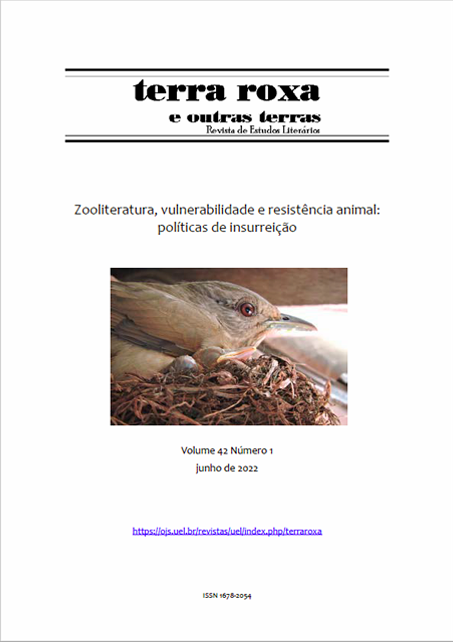Um causo de intersecção: retórica especista/sexista em "Contos Gauchescos", de Simões Lopes Neto
DOI:
https://doi.org/10.5433/1678-2054.2022v42p68-82Keywords:
sexism, speciesism, intersectionality, regionalismAbstract
Partindo da inquietação provocada pelo evento conhecido como “Resgate das porcas do Rodoanel”, mobilização popular acontecida em 2015 quando do acidente com uma carreta conduzindo fêmeas suínas para o abate em São Paulo, traçamos considerações sobre a intersecção das opressões sexista e especista sobre as fêmeas animais não humanas, utilizando o conceito de interseccionalidade proposto pela pesquisadora e ativista feminista Kimberlé Crenshaw, e analisamos sua representação na obra Contos Gauchescos, de Simões Lopes Neto, onde essa mesma intersecção serve aos propósitos de consolidar uma mitologia gaúcha veiculada pela literatura regionalista. Para tanto, nos valemos das reflexões contidas principalmente nas obras O animal que logo sou, de Jacques Derrida, e A política sexual da carne, de Carol Adams, além dos estudos sobre o fenômeno regionalista na literatura gaúcha levados a cabo por Regina Zilberman, Charles Kiefer e Luis Augusto Fischer, precedidos de uma breve contextualização da questão animal em sua dimensão social, filosófica e acadêmica.
Downloads
References
ADAMS, C. J. The sexual politics of meat: a feminist vegetarian critical theory. New York: The Continuum International Publishing Group, 2010
BANDEIRA, M. O bicho. Estrela da vida inteira. 20. ed. Rio de Janeiro: Nova Fronteira, 1993.
CANDIDO, A. Formação da literatura brasileira: momentos decisivos. 9. ed. Belo Horizonte: Itatiaia, 2000.
CHAVES, F. L. História e literatura. Porto Alegre: Editora da Universidade, 1988.
CROSARIOL, I. M. Por uma crítica literária antiespecista. III Congresso Internacional de Literatura e Ecocrítica, III. Disponível em http://ocs.codethe.net/index.php/ecocritica/ecocritica2016/paper/view/101
DECKHA, M. Animal advocacy, feminism and interseccionality. Deportate, esuli, profughe, Veneza, v. 23, jul. 2013. Disponível em https://www.unive.it/pag/fileadmin/user_upload/dipartimenti/DSLCC/documenti/DEP/numeri/n23/Dep_04.pdf.
DERRIDA, J. O animal que logo sou. São Paulo: Unesp, 2002.
FERREIRA, E. Metáfora animal: a representação do outro na literatura. Estudos de literatura brasileira contemporânea, Brasília, n. 26, p. 119-135, jul.-dez. 2005. Disponível em: <http://www.gelbc.com.br/pdf_revista/2607.pdf>.
Conciousness in human and non-human animals. Francis Crick Memorial conference, Cambridge, July 2012. Disponível em: http://fcmconference.org/.
LOPES NETO, J. S. Contos gauchescos. Porto Alegre: Artes e Ofícios, 1998.
MOREIRA, M. E. Regionalismo e literatura no Rio Grande do Sul. Porto Alegre: Escola Superior de Teologia São Lourenço de Brindes; Instituto Cultural Português, 1982.
PALMÉRIO, M. Chapadão do bugre. 7 ed. Rio de Janeiro: José Olympio, 1965
RYDER, Richard D. All beings that feel pain deserve human rights. The Guardian, London, 6 ago. 2005. Disponível em https://www.theguardian.com/uk/2005/aug/06/animalwelfare.
SINGER, P. Libertação animal. São Paulo: WMF Martins Fontes, 2013.
TIBURI, M. A mulher de costas. Rio de Janeiro: Bertrand Brasil, 2006.
YELIN, J. O giro animal na literatura de Wilson Bueno. Conexões Itaú Cultural, São Paulo, 2012. Disponível em: http://conexoesitaucultural.org.br/wp-content/uploads/2012/03/O-giro-animal-na-literatura-de-Wilson-Bueno-Julieta-Yelin-portugu%C3%AAs.pdf.
ZILBERMAN, R. Do mito ao romance – tipologia da ficçao brasileira contemporânea. Caxias do Sul: Universidade de Caxias do Sul; Porto Alegre, Escola Superior de Teologia São Lourenço de Brindes, 1977.
Downloads
Published
How to Cite
Issue
Section
License
Copyright (c) 2022 Terra Roxa e Outras Terras: Revista de Estudos Literários

This work is licensed under a Creative Commons Attribution-NonCommercial 4.0 International License.
Authors who publish in this journal agree to the following terms:
a) The authors retain the copyright and grant the journal the right of first publication, the work being simultaneously licensed under the Creative Commons Attribution-NonCommercial 4.0 International License, allowing the sharing of the work with acknowledgment of the authorship of the work and initial publication in this journal.
b) Authors are authorized to assume additional contracts separately, for non-exclusive distribution of the version of the work published in this journal (eg, publish in an institutional repository or as a book chapter), with acknowledgment of authorship and initial publication in this journal.
c) Authors are allowed and encouraged to publish and distribute their work online (e.g. in institutional repositories or on their personal page) after the editorial process, as this can generate productive changes as well as increase impact and citation of the published work (See The Effect of Open Access).
d) The authors of the approved works authorize the journal to, after publication, transfer their content for reproduction in content indexers, virtual libraries and the like.
e) The authors assume that the texts submitted for publication are of their original creation, taking full responsibility for their content in case of any objection by third parties.



















